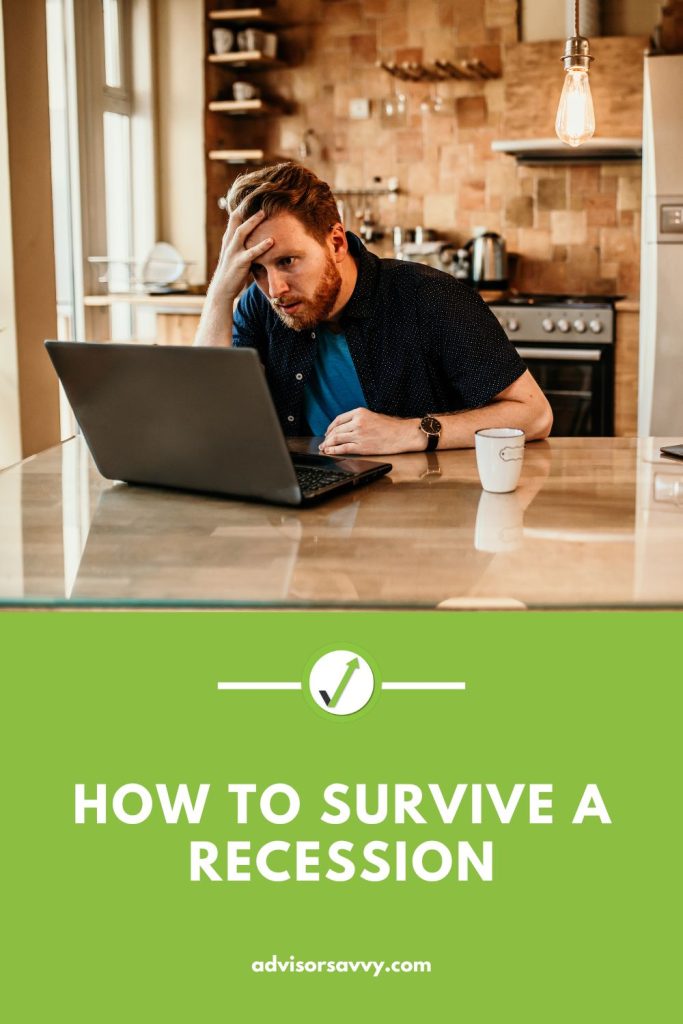
Many Canadians have been talking about a potential recession occurring. According to a recent survey, 54% of Canadians anticipate a recession will occur in 2024 and 32% believe Canada is already in a recession. The governing economic and political bodies haven’t announced an official recession, but there are indicators of financial trouble ahead. More specifically, high inflation and rising interest rates, both of which are apparent in Canada right now, indicate an economic downturn. With so much anticipation of a decline, you might be wondering how to survive a recession. We’ll cover details about what a recession is and tips to weather the storm with this article. Keep reading to learn more!

Table of contents
What is a recession?
A recession is defined as a short to medium period of time where notable economic decline is experienced. In more technical terms, a recession is measured as two consecutive quarters where negative gross domestic product (GDP) is experienced. During periods of recession, consumer spending is reduced, mass layoffs occur, and there is generally a contraction in economic activity.
Related Reading: Recession vs Depression: What’s The Difference?
CIBC Investor’s Line Offer
Up to $6.95 per online stock or ETF trade. Plus, there’s no minimum account balance.
Is Canada in a recession now?
No, Canada is currently not in a recession according to governing political and economic entities. According to the Globe and Mail, the Canadian economy shrank by 1.1% in the third quarter of 2023. In the second quarter of 2023, the economy grew by 1.4%. Statistics from the fourth quarter of 2023 have not become available yet. However, if Canada has negative economic growth in this quarter, Canada would technically be in a recession.
Many residents and experts believe Canada will go into a recession in 2024. Between rising interest rates and high inflation, Canadians are feeling financial pressure. These factors are classic signs of a recession and it’s expected to come to a head this year. If a recession were to occur, most are hopeful that the market will turn upwards again by 2025.
How long do recessions last?
Recessions last between three and nine months on average in Canada. For this reason, Canadians can expect some financial struggle during a recession, but it won’t last forever!
How much money do you need to survive a recession?
During a recession, cash is king. This is because the cost of living typically rises so having cash on hand can help you weather unexpected cost increases. There is also a greater risk that you will lose your job during a recession. So how much money should you have set aside to overcome these potential challenges?
Most prepare for a recession using an emergency fund. A healthy emergency fund has between three and six months worth of living expenses. The amount you should have in your emergency fund depends on your income, expenses and general lifestyle. In addition, these funds are easily accessible during emergencies, not locked into investments.
Should I hold cash in a recession?
Yes, you should have cash available for use at any time during a recession via an emergency fund. Having cash readily available will help you prepare for price increases or potential job loss.
If you already have an emergency fund at your disposal and extra cash to spend, it’s wise to invest during periods of recession. Typically, the cost of investments falls during a recession meaning that you can buy low. Then, when the economy recovers at a later date, you will be able to sell high, thereby realizing a profit. However, you should only invest during periods of recession if you have spare cash available outside of an emergency fund and your day to day cash flow.
Related Reading: Tips for Finding a Job During a Recession
How to Survive a Recession
Recessions can be challenging to navigate financially. Unfortunately, the conditions of a recession are often outside of your control. You might face unexpected job loss or a surge in your daily expenses. But there are things you can do to prepare and navigate the situation. Here are some tips on how to survive a recession:
- Build an emergency fund. If you haven’t already, build an emergency fund. Start by determining what three months worth of your living expenses are and make that your savings target. If you already have an emergency fund, consider adding more funds to it.
- Create a budget. If you aren’t on a budget already, create one and stick to it. This will help you control your spending and identify when the cost of certain things is increasing. This way, you can quickly respond and adjust your spending if you notice something has become unaffordable.
- Don’t touch your investments. During a recession, it’s not uncommon for investments to suddenly tank. In response, many panic sell their investments to “minimize” losses. The reality is that most investments recuperate in the long run, so panic selling in the short term isn’t a wise decision. So, don’t touch your investments until the market stabilizes and you’re thinking rationally.
- Pay down debt and don’t take on more. Because interest rates tend to rise during periods of recession, the cost of your debt will rise too. For this reason, having minimal debt is advisable so you aren’t plagued by high interest. In addition, do your best not to take on new debt during a recession. If you need financial support to make ends meet, consider reaching out to friends and family first.
- Reconsider your employment. Some industries are more susceptible to layoffs during recessions than others. If you’re concerned about a potential lay off, get ahead of the curve and start considering other employment opportunities. You never know, it could be the start of an exciting, new career!
- Remember it won’t last forever. When you’re struggling financially, it may feel neverending. However, recessions typically last between three and nine months, so things will turn around eventually. Remembering this can help you stay optimistic and on track with your financial goals.
How to survive a recession in retirement?
If you’re retired, a recession brings some unique challenges. The main challenge is that most retirees are on a fixed income but have to manage the rising cost of living expenses. Fortunately, they don’t need to worry about job loss since they’re already retired. In addition, most retirees paid off all their debt, so they don’t need to worry about the rising interest rates. Below are a few tips on how to survive a recession in retirement:
- Maintain a cash reserve. Most retirees are living off an investment portfolio or have their equity tied up in their home. However, retirees should have an emergency fund available to manage rising costs. Be sure that your money isn’t all tied up in investments otherwise it might be challenging to make ends meet.
- Diversify your investments. Diversification is an important strategy to employ during a recession. Often, one industry is impacted more than another during a downturn. By diversifying your portfolio, you can better preserve your nest egg.
- Take advantage of senior discounts. Retirees have access to a number of senior discounts on basic goods and services. If you aren’t already, get into the habit of optimizing these discounts as it can help keep your costs low while on a fixed income.
What not to do during a recession?
During a recession, there’s a few things you should never do. Let’s take a closer look below:
- Panic sell investments. The price of investments can suddenly fall during a recession. In response, you might panic at the loss and make the decision to sell in a rush. However, your investments will likely recuperate in the long run, so don’t sell them until the economy recovers.
- Take on new debt. Interest rates usually rise during a recession. This means debt is more expensive to borrow. For this reason, you shouldn’t take on new debt during a recession if you can avoid it.
- Splurge cash. Cash is king during a recession so it should be preserved. Try to spend it sparingly and only on necessities. The rest should be set aside for emergencies.
Preparing for a Recession in Canada
Periods of recession are never a fun time, but it’s a necessary rebalancing stage of our economic cycle. Make sure you diversify your investments, maintain a healthy emergency fund, stick to a budget, and keep your debt levels low, and you’ll survive a recession with ease. We hope the other tips on how to survive a recession were helpful. But if you find yourself with more questions than answers, a financial advisor can help. Complete this quick questionnaire to be matched with a financial advisor who can help you prepare for a recession!
Read More: Surviving Inflation: Top 7 Tips

